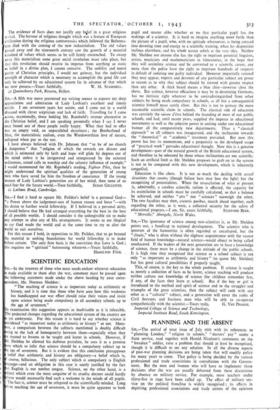SCIENTIFIC EDUCATION
la,—In the interests of those who must needs endure whatever education s made available to them after the war, comment must be passed upon e following statement made under the above heading by your corre- pondent, Mr. Norman Sheldon: "The teaching of science is as important today as arithmetic or history, and it is time that those who have seen how this weakness has handicapped our war effort should raise their voices and insist upon science being made compulsory in all secondary schools up to the age of seventeen."
n examination this suggestion appears as inadvisable as it is infeasible. e projected changes regarding the educational system of the country are yet embryonic. For this reason it is hard to say whether science is nsidered "as important today as arithmetic or history" or not. More- ver, a comparison between the subjects mentioned is doubly difficult wing to the lack of homogeneity between them—especially when they
e treated 'as lessons to be taught and learnt in schools. However, if r. Sheldon be allowed his dubious postulate, he uses it as a premise om which to infer that science should be a compulsory subject up to e age of seventeen. But it is evident that this conclusion presupposes belief that arithmetic and history are obligatory—a belief which is, course, fallacious. The only subject which is compulsory is English nguage—and an obligation in this case is surely justified by the fact at English is our mother tongue. Science, on the other hand, is a bject which even the most sanguine of its erudite doctors could hardly lime would necessarily find such a welcome in the minds of all pupils. The fact is, science must be relegated to the scientifically minded. Long fore reaching the age of seventeen, it must be quite apparent to both
pupil and master alike whether or no that particular pupil has the makings of a scientist. It is hard to imagine anything more futile than the picture of a pupil, who, with no aptitude whatsoever, is being coerced into devoting time and energy to a scientific training, when his disposition inclines elsewhere, and his whole nature rebels at the very idea. Neither Mr. Sheldon nor anyone else has the right to imprison potential linguists, artists, musicians and mathematicians in laboratories, in the hope that they will assimilate science and be converted to a scienufic career, any more than the police have the right to imprison hundreds of suspects in default of isolating one guilty individual. However impartially rational they may appear, experts and devotees of any particular subject are prone to reason as to why that subject should be treated with greater respect than any other. A thick beard means a blue chin—however close the shave. But science, however efficacious it may be in destroying Germans, has no intrinsic right whatever to be contradistinguished from other subjects by being made compulsory in schools, as all bin a consequential scientist himself must surely allow. But this is not to gainsay the more reasonable scientific claim in schools. The classical side of education was certainly the raison d'être behind the founding of most of our public schools, and had, until recent years, supplied the impetus in educational movements as well as the cohesive power in uniting under one educational banner all the comparatively new departments. Thus a "classical approach" to all subjects was inaugurated, and the inclination towards the " theoretical " or " academic " treatment prevailed. But now this power has lost its momentum, and a propensity to the developed usage of "practical work" pervades educational thought. Now this is a genuine development—part of the natural growth of the British educational system, and therefore to be tolerated by those whose inclinations are not scientific. Such an artificial limb as Mr. Sheldon proposes to graft on to the system is not to be compared with this new development, which is inherently congenital, Education is like chess. It is not so much the dealing with actual situations that counts (though failure here may lose the fight) but the recognising of potentialities. When the resuscitation of what at present is, admittedly, a careless scientific tuition is effected, the capacity for its assimilation in schools must be carefully calculated, so that a balance be achieved, and neither " arts " nor " sciences " outweigh the other. The two faculties may then, coezeris paribus, march ahead together, each regarding the other, as it were, a collateral security for the safety of educational progress.—I am, Sir, yours faithfully, STAFFORD BEER. " Morville," Abergele, North Wales.


























 Previous page
Previous page